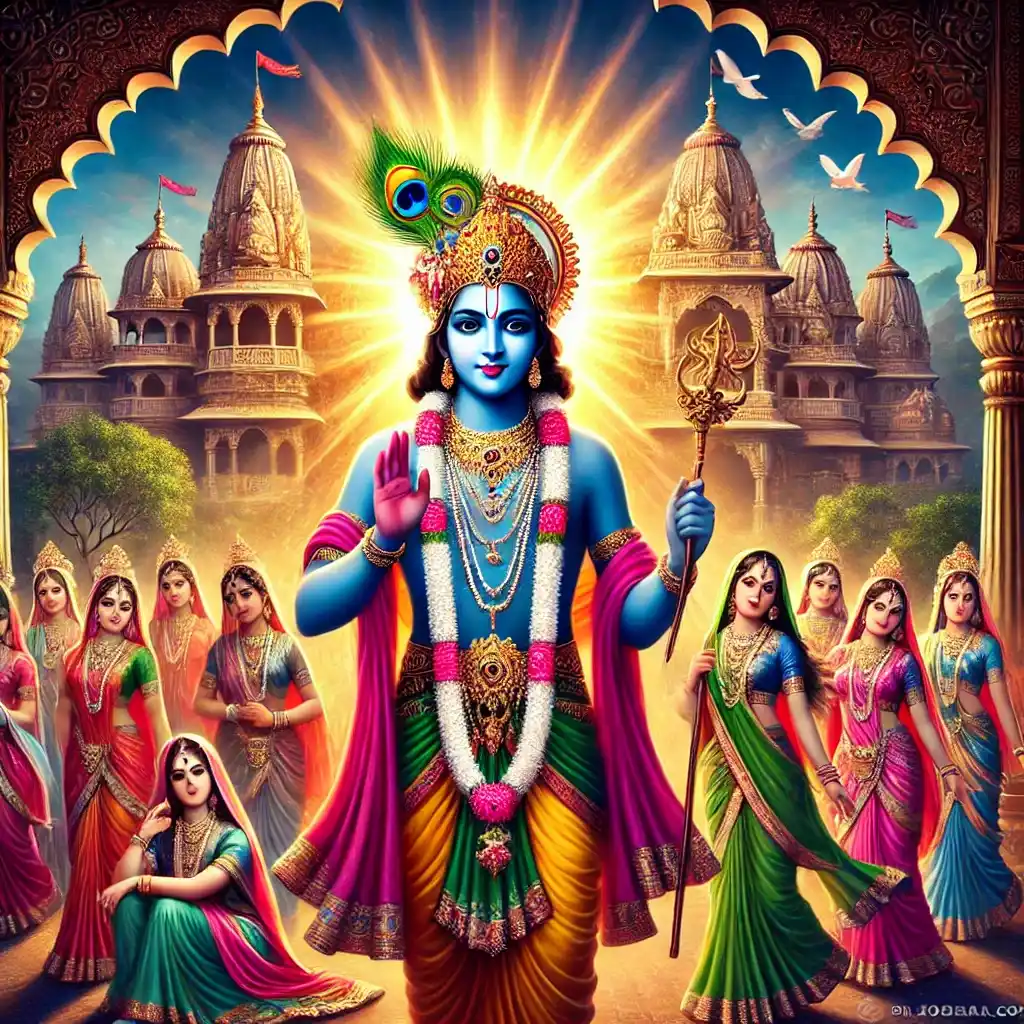
Spiritual Guidance and Inspiration
The Story Behind the 16,100 Wives of Lord Krishna
A Symbol of Divine Compassion
Lord Krishna, one of the most revered and beloved deities in Hinduism, is known for his divine exploits, teachings, and multi-dimensional personality. His role as a hero in the Mahabharata, as the charioteer to Arjuna in the Bhagavad Gita, and as a mischievous cowherd in his youth has captured the hearts of millions. However, one of the most intriguing and lesser-discussed aspects of his life is the story of his 16,100 wives. Far from being a mere tale of mass marriages, this narrative speaks to the depths of Krishna’s divine compassion, his duty as a protector of dharma, and the transcendence of human limitations.
In this blog, we’ll delve into the story of Krishna’s 16,100 wives, unraveling its deeper spiritual, social, and symbolic meanings. By exploring ancient scriptures and interpretations, we’ll see how this tale goes beyond its literal meaning and offers profound insights into the nature of divine love and grace.
Who Were the 16,100 Wives of Lord Krishna?
The story of Krishna’s 16,100 wives originates from ancient Hindu texts such as the Bhagavata Purana, Harivamsa, and Vishnu Purana. These women were not ordinary individuals but rather unfortunate souls who had been captured and imprisoned by the demon Narakasura. To understand the context of their plight, it’s essential to explore the background of Narakasura and the era in which this story unfolded.
The Tyranny of Narakasura
Narakasura was a powerful and malevolent demon king who ruled over the kingdom of Pragjyotisha, which lay in modern-day Assam. He was the son of Bhumi Devi (the Earth Goddess) and the demon Hiranyaksha. Narakasura, after receiving a boon from Lord Brahma, became nearly invincible—his boon stipulated that no one but his mother could kill him. This made him arrogant and tyrannical, and he began to terrorize kingdoms, loot riches, and abduct women. His reign of terror spread fear across the land, and no one dared to challenge him.
As his cruelty grew, Narakasura abducted 16,100 maidens from different regions, forcing them into captivity in his fortress. These women were destined to live as slaves and concubines, stripped of their freedom and dignity. Their situation was dire, and they had little hope of rescue, especially given Narakasura’s near-immortality.
Krishna’s Rescue of the 16,100 Maidens
The rescue of these 16,100 women is a crucial chapter in Krishna’s life, showcasing his role as a divine protector and upholder of righteousness (dharma). Narakasura’s cruelty eventually extended to the celestial realms, as he stole the divine earrings of Aditi, the mother of the gods, and even captured several celestial maidens. This act of defiance enraged the gods, who sought Krishna’s help in defeating the demon.
The Divine Battle: Krishna and Satyabhama vs. Narakasura
Krishna, ever ready to restore justice, decided to confront Narakasura. However, as per the boon given to Narakasura, only his mother could kill him. Krishna, knowing this, took his wife Satyabhama (an incarnation of Bhumi Devi) with him to the battlefield. Together, they waged war against the demon and his army.
The battle was fierce, with Narakasura unleashing all his powers to resist Krishna’s onslaught. However, the demon's fate was sealed when Krishna allowed Satyabhama to strike the final blow, thus fulfilling the condition of the boon. Narakasura was killed, and his reign of terror came to an end.
As the gates of Narakasura’s fortress were opened, the 16,100 imprisoned women were freed. These women had spent years in captivity, fearing for their lives and their honor. Upon their release, they realized that despite being innocent, their fate was uncertain. In the rigid social norms of ancient times, women who had been associated with another man, even unwillingly, were often ostracized and deemed impure.
Krishna’s Compassionate Act: Marrying the 16,100 Women
The 16,100 women, though liberated from Narakasura’s imprisonment, faced a grave social dilemma. In the society of the time, a woman’s purity and honor were of paramount importance. The mere fact that they had been held captive by another man, especially a demon, meant they would likely face social rejection and isolation upon returning to their families.
Realizing this, the women turned to Krishna for help. They expressed their fear of being ostracized and requested that Krishna marry them. In doing so, they sought not just protection but a way to reclaim their dignity and place in society. Krishna, embodying divine compassion, agreed to marry all 16,100 women.
A Symbolic Marriage
It’s important to note that this mass marriage was not a typical, worldly union. Krishna’s marriages to these women were largely symbolic, representing his divine love and commitment to restoring their honor. Krishna, as the supreme being, transcends human limitations and societal norms. His decision to marry the 16,100 women was an act of compassion, aimed at preserving their dignity and ensuring they were not cast out by society.
Krishna’s acceptance of these women reflects his role as a protector of those in need, his adherence to dharma, and his willingness to uplift the downtrodden. In many ways, the story symbolizes the divine’s acceptance of all souls, regardless of their past circumstances.
Symbolism Behind the 16,100 Wives
While the literal interpretation of Krishna’s 16,100 wives tells a story of compassion and justice, the deeper symbolic meanings offer profound spiritual insights. These wives are often seen as metaphors for the individual soul’s relationship with the divine.
Representation of Souls Seeking Refuge
In the realm of devotional literature, Krishna’s 16,100 wives are often seen as symbolic representations of souls (jivas) seeking refuge in God. Just as these women sought protection and redemption from Krishna, so too do countless souls seek liberation from the cycle of birth and death (samsara) and refuge in the divine.
Krishna’s acceptance of all these women, regardless of their past, represents God’s unconditional love for all beings. No soul is ever beyond redemption, and Krishna’s act of marrying them signifies that divine love transcends societal judgments and worldly conditions.
Restoration of Honor and Dignity
One of the key themes of this story is the restoration of honor. Krishna’s decision to marry these women ensured that they were not only saved from a life of suffering but also that they were restored to a position of respect within society. This act highlights Krishna’s role as a protector of dharma and a champion of justice, ensuring that no individual is unjustly marginalized or humiliated.
Transcending Human Norms
Krishna’s marriages to the 16,100 women also highlight his transcendence of human norms and limitations. As a divine being, Krishna’s actions cannot be measured by worldly standards. His ability to marry and provide for 16,100 women simultaneously underscores his divinity and infinite capacity for love. In this sense, Krishna’s marriages are not about physical relationships but about the limitless nature of divine grace.
Life of Krishna’s 16,100 Wives After Marriage
Following their marriage to Krishna, the 16,100 wives were settled in the magnificent city of Dwarka, where Krishna ruled as king. Each wife was provided with her own palace, and Krishna, through his divine powers, manifested himself in multiple forms to ensure that every wife felt his presence equally.
Krishna’s Divine Multiplication
The Bhagavata Purana describes how Krishna manifested 16,100 forms of himself, allowing each wife to experience his presence as if he were solely with her. This miraculous event further highlights Krishna’s divine nature. Unlike human relationships, which are bound by time and space, Krishna’s love for each of his wives was limitless, ensuring that none of them felt neglected or alone.
In these palaces, Krishna lived as a devoted husband, attending to the needs and desires of each wife, ensuring that all felt loved and cherished. This divine multiplication is often interpreted as a metaphor for the omnipresence of God, who can be with all souls simultaneously, offering each individual a unique and personal experience of the divine.
Historical and Cultural Interpretations
The narrative of Krishna’s 16,100 wives has been interpreted in various ways across different cultures and scholarly traditions. While some view it as a historical account, others see it as an allegory for the soul’s relationship with the divine. Let’s explore some of the most common interpretations.
Historical Perspective
From a historical standpoint, some scholars suggest that the story may reflect the socio-political conditions of ancient India. It was not uncommon for conquering kings or rulers to take captives, including women, as spoils of war. In such cases, marriages were sometimes arranged to restore the women’s social status.
Krishna’s act, however, diverges from this practice. His marriages were not motivated by power or conquest but by a desire to restore the dignity of the women and to protect them from societal scorn. This distinction emphasizes Krishna’s role as a righteous king and a divine protector.
Spiritual Allegory
Many Hindu scholars and theologians interpret the story as an allegory for the soul’s relationship with God. The 16,100 wives are seen as symbolic of the countless souls in the universe, each seeking refuge and liberation. Krishna, as the supreme being, accepts all souls, offering them love, protection, and salvation.
This interpretation highlights the inclusive nature of divine love, which transcends worldly limitations and embraces all who seek it. Krishna’s marriages, in this sense, are not about physical unions but about the soul’s ultimate union with God.
Conclusion: A Story of Divine Love and Compassion
The story of Krishna’s 16,100 wives is far more than a tale of mass marriages. It is a profound narrative that speaks to the nature of divine love, compassion, and justice. Krishna’s actions exemplify his role as a protector of dharma, a restorer of honor, and a symbol of unconditional love.
For devotees and spiritual seekers, this story serves as a reminder that divine love knows no bounds and that God, in his infinite grace, will always uplift and restore those who are oppressed or marginalized. Just as Krishna accepted and honored the 16,100 women, so too does he embrace every soul that seeks his shelter.
In a world where social norms often dictate the value of an individual, Krishna’s actions remind us that true worth lies not in societal judgments but in the eyes of the divine. His marriages to the 16,100 women symbolize the boundless, compassionate love that God extends to all, regardless of their past.

Explore the latest and most popular products available on Amazon, handpicked for your convenience! Whether you're shopping for tech gadgets, home essentials, fashion items, or something special, simply click the button below to view the product on Amazon. We’ve partnered with Amazon through their affiliate program, which means that if you make a purchase through this link, we may earn a small commission at no extra cost to you. This helps support our site and allows us to continue providing valuable content. Thank you for your support, and happy shopping!